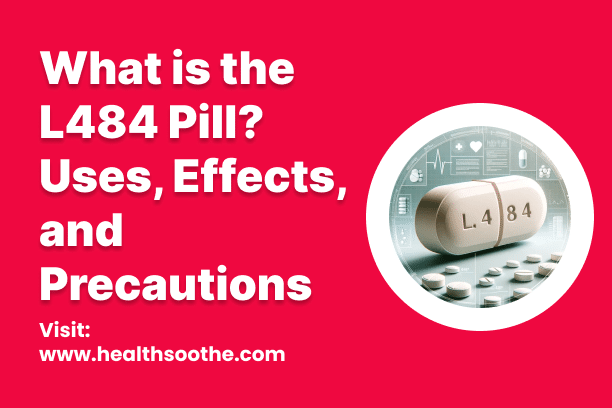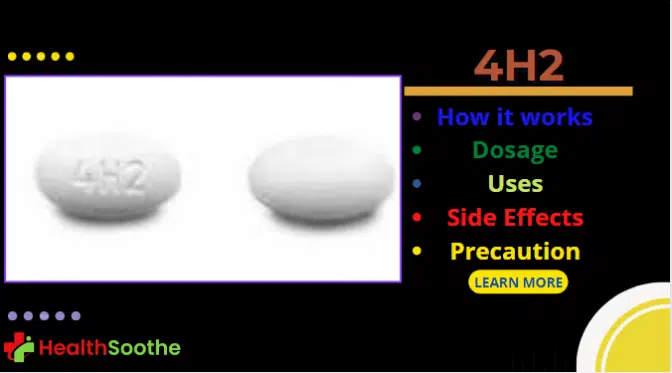L484 Pill (Acetaminophen ) is employed for alleviating mild to moderate pain associated with conditions such as headaches, menstrual periods, toothaches, backaches, osteoarthritis, or discomfort from cold/flu, as well as for lowering fever.
How to use Acetaminophen Extra Strength
Take this product orally as instructed. Follow all guidelines provided in the product package. If you have any queries, consult your doctor or pharmacist.
Given the various brands and forms of acetaminophen available, carefully read the dosage instructions for each product as the acetaminophen content may vary. Avoid exceeding the recommended acetaminophen dose (refer to the Warning section).
When administering acetaminophen to a child, ensure the use of a product specifically designed for children. Determine the appropriate dose based on your child's weight, indicated on the product package. If the child's weight is unknown, use their age.
For suspensions, shake the medication thoroughly before each dose. Some liquids may not require shaking. Adhere to the directions on the product package. Utilize the provided dose-measuring spoon/dropper/syringe to accurately measure liquid medication; avoid using a household spoon.
For rapidly-dissolving tablets, chew or allow them to dissolve on the tongue before swallowing, with or without water. Chew chewable tablets thoroughly before swallowing.
Avoid crushing or chewing extended-release tablets, as this may lead to the rapid release of the entire drug, increasing the risk of side effects. Swallow the tablets whole.
For effervescent tablets, dissolve the prescribed dose in the recommended amount of water and then consume the solution.
Pain medications are most effective when used at the onset of pain symptoms. Delaying until symptoms worsen may reduce the medication's efficacy.
Do not use this medication for fever for more than 3 days unless directed by your doctor. For pain relief in adults, refrain from using this product for more than 10 days (5 days in children) unless directed by a doctor. If a child experiences a sore throat, especially accompanied by high fever, headache, or nausea/vomiting, promptly consult a doctor.
Inform your doctor if your condition persists, worsens, or if new symptoms emerge. Seek immediate medical assistance if you suspect a serious medical problem.
Side Effects
Typically, this medication causes no side effects. If you experience any unusual effects, promptly reach out to your doctor or pharmacist.
If your doctor has prescribed this medication for you, it means they have assessed that the benefits outweigh the potential risks of side effects. Most individuals using this medication do not experience severe side effects.
While very rare, a serious allergic reaction to this drug may occur. Seek immediate medical assistance if you observe any signs of a severe allergic reaction, such as a rash, itching/swelling (particularly of the face/tongue/throat), severe dizziness, or difficulty breathing.
Read Also: I took an expired Gynaecosid Tablet by accident. What would happen to me?
Pros and Cons of L484
Pros
- Pain Relief
- Fever Reduction
- Widely Available
- Minimal Gastric Irritation
Cons
- Risk of Overdose
- Limited Anti-Inflammatory Action
- Interaction with Other Medications
Differences Between L484 and K18 Pill
L484
- L484 is an imprint on an oblong, white pill.
- It is commonly associated with over-the-counter acetaminophen (Tylenol) medications.
- Acetaminophen is used for pain relief and fever reduction.
- It does not possess anti-inflammatory properties.
K18
- K18 is an imprint on a round, white pill.
- It is commonly associated with generic oxycodone hydrochloride.
- Oxycodone is a prescription opioid analgesic used for the management of moderate to severe pain.
Alternative to L484
Aspirin
- Aspirin is an NSAID with pain-relieving and anti-inflammatory properties.
- It also has blood-thinning effects, which may be a consideration for some individuals.
Warnings
Excessive intake of acetaminophen can lead to severe, potentially fatal liver disease. Adults should not exceed a daily dose of 4000 milligrams (4 grams) of acetaminophen. Individuals with liver issues and children should consume a lower amount of acetaminophen. Consult your doctor or pharmacist to determine the safe dosage for acetaminophen.
Do not combine this medication with any other product containing acetaminophen without seeking advice from your doctor or pharmacist first. Acetaminophen is present in numerous over-the-counter and prescription medications, including pain/fever relievers and cough-and-cold products. Check the labels of all your medications to identify acetaminophen content, and seek clarification from your pharmacist if uncertain.
If you suspect an overdose of acetaminophen, seek immediate medical assistance, even if you feel well. Symptoms of overdose may include nausea, vomiting, loss of appetite, sweating, stomach/abdominal pain, extreme fatigue, yellowing of the eyes/skin, and dark urine.
Regular alcohol consumption, particularly in conjunction with acetaminophen, may harm your liver. Refrain from consuming alcohol.
Precautions
Before taking acetaminophen, inform your doctor or pharmacist about any allergies you may have, as this product could contain inactive ingredients that may cause allergic reactions or other complications. For additional information, consult your pharmacist.
Prior to using this product, disclose your medical history to your doctor or pharmacist, particularly if you have a history of liver disease or engage in regular alcohol use/abuse.
Liquid products, chewable tablets, dissolving/effervescent tablets, and powders may include sugar or aspartame. Exercise caution if you have diabetes, phenylketonuria (PKU), or any other condition requiring you to limit or avoid these substances in your diet. If you have any of these conditions, seek advice from your doctor or pharmacist on the safe use of these products.
Inform your doctor if you are pregnant before using this medication.
Since acetaminophen passes into breast milk, consult your doctor before breastfeeding.
Interactions
Interactions with other drugs can impact the effectiveness of your medications or increase the risk of serious side effects. This document may not encompass all potential drug interactions. Maintain a comprehensive list of all products you use, including prescription/nonprescription drugs and herbal products, and share it with your doctor and pharmacist. Refrain from initiating, discontinuing, or altering the dosage of any medicines without your doctor's approval.
Some products that may interact with this drug include: ketoconazole, levoketoconazole.
This medication has the potential to interfere with certain laboratory tests, leading to possible false test results. Ensure that both laboratory personnel and all your healthcare providers are aware of your use of this drug.
Overdose
Emergency Situations: If an individual experiences a drug overdose with severe symptoms such as loss of consciousness or difficulty breathing, dial 911 immediately. Alternatively, contact a poison control center promptly. US residents can reach their local poison control center at 1-800-222-1222, while Canada residents should call a provincial poison control center. Overdose symptoms may manifest as nausea, vomiting, loss of appetite, sweating, stomach/abdominal pain, extreme fatigue, yellowing of the eyes/skin, and dark urine.
Important Notes: Acetaminophen does not induce stomach and intestinal ulcers, a side effect commonly associated with NSAIDs like aspirin, ibuprofen, and naproxen. However, it does not possess anti-inflammatory properties like NSAIDs. Consult your doctor for more information and to determine the most suitable medication for your needs.
Missed Dose: If you are following a regular medication schedule and happen to miss a dose, take it as soon as you recall. If it is close to the time of your next scheduled dose, skip the missed dose and resume your regular dosing. Avoid doubling the dose to compensate.
Storage: Keep the medication at room temperature, away from light and moisture. Do not store it in the bathroom. Ensure that all medications are stored out of reach of children and pets.
Disposal: Do not dispose of medications by flushing them down the toilet or pouring them into a drain unless instructed to do so. Properly discard the product when it expires or is no longer needed. Seek guidance from your pharmacist or local waste disposal company for appropriate disposal methods.
Conclusion
While L484 is imprinted on a commonly used acetaminophen pill, it is crucial to approach its usage with diligence and awareness. Understanding the potential risks, such as overdose symptoms and interactions with other medications, is vital for ensuring the safe and effective use of acetaminophen.
Seeking immediate medical attention in case of an overdose and maintaining open communication with healthcare providers regarding missed doses or any concerns is paramount. Moreover, recognizing that acetaminophen does not possess anti-inflammatory properties like some other pain relievers is essential for informed decision-making. By following prescribed guidelines, storing the medication properly, and disposing of it appropriately, individuals can navigate the use of L484-marked acetaminophen responsibly and contribute to their overall well-being.


